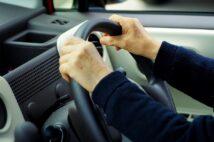Kasamatsu Racecourse is always a mess. On February 18th, a report of "Cancellation of the Umehana Series" was broadcast, and many people thought for a moment, "I wondered if I did something again, or there was a scandal." Korona-ka hits us directly. In order to prevent the spread, it was decided that the event had to be canceled.
First, in January, two jockeys belonging to the group were found to be infected with the new coronavirus. A cluster occurred in February, and the flow of infection could not be stopped. The inability to hold the event disappointed the fans who supported it, prevented them from buying betting tickets, and affected the lives of those involved in the stables. In the work area where it is easy to be crowded, the "overcrowding" of work due to lack of jockeys was also added. The horse racing union is aiming to overcome the Korona-ka and restart it, but is it possible to thoroughly prevent the spread of infection? We examined the situation and problems at the site where the race was canceled.
■ 11 out of 17 jockeys are positive for corona
Last year, I took a rest for eight months due to a big scandal. "Newborn Kasamatsu Horse Racing" was appealing, and I hoped that the peaceful days would continue for the time being, but it was not so sweet. Only five months have passed since I started again, but I faced the severe situation of canceling the event again.
The number of jockeys belonging to Kasamatsu Horse Racing was halved to nine due to illegal purchase of betting tickets, but the new coronavirus infection was overtaken. Since January 24, 11 out of 17 jockeys, including 8 jockeys for a limited time, have been found to be positive for corona. After February 6th, a total of 9 people tested positive in the PCR test before and after the Kisaragi series (7th to 11th), and the horse racing association judged that clusters had occurred during the event. I decided to cancel the next event.
During the race, the jockeys will be canned in the racecourse from the night before the first day to the end of the race on the last day, and will sleep in the adjustment room. In February, 4 people were positive on the 6th, 2 people on the 9th, and 1 person each on the 12th, 13th, and 18th. For this reason, corona infections in business areas such as the adjustment room and jockey waiting room became concentrated, and it was judged that a cluster occurred.
■ Adjustment room and jockey waiting room are easy to get crowded
The precursor to the cluster was the Mutsuki series (January 25-28). According to people familiar with the matter, it seems that multiple jockeys went out to eat and drink on the day before all the holidays of the previous week and became infected, and on January 24, two jockeys belonging to them were found to be positive. Two people were suspected of having close contact, and a total of four people changed their riding from the next day. At this point, in the adjustment room, the double room was eliminated and it became a private room. The number of people is limited when using the bath. I tried to eat in my own room, not in the dining room. The race was held for four days from the 25th, but it is said that the horse racing union was wondering if the infection would spread in the adjustment room.
There is also a shared entertainment room in the adjustment room. During the race, you can chat with your jockey friends and heal your physical and mental fatigue. In addition, you can check the race you rode on a VTR, and in the case of illegal purchase of betting tickets by jockeys, a "strategy meeting" was held, which became a hotbed for fraudulent activities. Surveillance cameras were added in response to a series of scandals.
After the race that day, I spend a lot of time in the adjustment room, saying, "I'm taking proper measures to prevent the spread of the infection. I have to get everyone in the cafeteria to drink and get sick." The jockeys were eating leisurely in a private room.
In Gifu prefecture, 500 to 800 corona-infected persons are confirmed every day, and priority measures such as prevention of spread are re-extended. After leaving the adjustment room, the jockeys will have more free time, but it is better to refrain from appearing in the city at night, and eating out in the group that became a problem with this infection will be for a while. Should be patient.
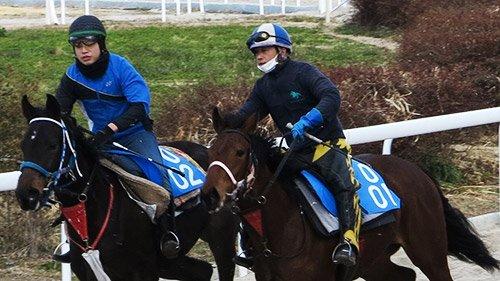
In the jockey waiting room, which is located in the business area and has a lot of people coming and going, regular race videos and patrol videos are also shown, and jockeys who have just finished the race check each other's riding performance. The sofas are lined up facing each other across the stove, and they sometimes chat without a mask. A space that is easily crowded in a small space. With the addition of many jockeys for a limited time, it became more lively and was lively, especially among young people.
■ Short sleep time, super hard work due to lack of jockey
Due to a shortage of jockeys due to a series of scandals, the training time from 1:00 am to 9:00 am was extremely hard work, such as riding about 30 horses per person. Since September of last year, the actual races have continued every other week, and it seems that the jockeys were forced to ride without rest even if it was tight, as it was easy to accumulate fatigue.
"Sleeping time is from 9:30 pm to 1:00 pm, about three and a half hours a day," said the young jockey. On Saturdays and Sundays, there are tough guys who work part-time until midnight and attack horses all night, and the jockeys in Kasamatsu seem to have less sleep. This was also to protect their lives by reducing their income, but overwork would have tended to reduce their physical strength, and their health risks were increasing. Many corona-infected persons have been released, but in addition to the general three-cs, the "overcrowding" of work due to the lack of jockeys seems to have contributed to the spread of the infection. In the jockey waiting room, there is a lot of free time for offensive horses and going in and out during the race, and young jockeys take care of harnesses in the surrounding area, and there are also staff members who perform cleaning work. There are now two jockey buses heading to the paddock, and the jockeys in Nagoya and Kasamatsu are now moving separately. There is also a saddle station and a calibration room in the work area, and it is necessary to take measures to divide the "traffic line" of the jockeys so that they do not become dense. In addition to adding surveillance cameras to prevent fraud, manpower measures should be taken, such as assigning instructors to prevent corona infection.
■ Jockeys for a limited time are also infected with corona, and they have a hard time
The NAR (National Association of Racing)'s "Guidelines for Preventing the Spread of Coronavirus Infection" lists detailed measures. In the jockey waiting room, it is obligatory to wear a mask except immediately before or during the race. Horse racing associations and jockeys should keep an eye out and call for thorough infection control measures during the race, and each jockey should raise awareness of basic infection control measures such as wearing masks.
Jockey Shigeharu Mabuchi (Hokkaido) extended the period until the 18th for the limited-time riding of the helpers who supported Kasamatsu. Jockey Tanaka Kota (Oi) will ride until April 10. Jockey Masamitsu Senoo returned to Kochi after shortening the riding period scheduled until the end of March, partly because Kasamatsu was not held for a month due to Korona-ka. Many of the jockeys for a limited time became infected with corona, which would have been a pain. Jockey Senoo was seriously injured in a fall accident during a race in Kochi.
At the stage of January, there was no spread of infection during the race, and there was optimism, but in February, the infection was chained. The horse racing union was also disappointed, saying, "Because there was the last time, everyone refrained from doing so and thought they knew it." It is not the best for everyone to go out and eat and drink, so it may be necessary to take measures such as "no going out" to places that tend to be crowded. At the cluster in February, some fans said, "I think the response was delayed."
■ Around the course energetically with an offensive horse for resumption
Jockeys infected with corona recover without becoming seriously ill. I was working hard on the offensive horse from early morning. February 23, which should have been a great success due to the holidays. It was a pity that there was no race, but the jockeys were moving as usual. "Everyone is working hard on offensive horses," so I'm relieved that there are jockeys who go around the course energetically while showing a smile. Even if there are scandals or Korona-ka, as long as there are racehorses in the stables of Kasamatsu, the offensive horses on the banks of the Kiso River will continue forever.
In 2021, "start from minus" with a deficit of about 1 billion yen. Since the resumption in September last year, betting ticket sales have been strong, and it was predicted that the deficit at the end of the fiscal year could be reduced to 520 million yen (December last year). In January, betting ticket sales exceeded 600 million yen for the second consecutive day, and it seemed that the deficit could be further reduced, but the event was canceled due to the Korona-ka, and the brakes suddenly stopped. Stable owners, jockeys, trainers, grooms, and other stables will need to be paid compensation for the amount equivalent to the race, and it is expected that a deficit of tens of millions of yen will increase at one event. February, when Kanazawa and Iwate are closed in winter, is a season when Kasamatsu's sales are growing, and "it was a waste to reduce the deficit." In the future, I would like to ensure the health of all jockeys by conducting PCR tests as needed, and manage to regain the health of all jockeys at the 2nd meeting in March.
This time, it's not a scandal, but a fight against the "difficult enemy" of Korona-ka, which is shaking the world. The "haze" that has covered the racetrack for the past one or two years is not clear at once, but the jockeys take a rest for one event and charge. With the arrival of spring, I want to say "the engine is fully open."
■ The horse flu has shortened the total by 4 days.
Speaking of canceling the Kasamatsu horse race, two events have been canceled due to the match-fixing and stimulant cases in the Showa period (1975). Two people were killed or injured in a horse race / collision accident (October 2013), and one horse was canceled due to a horse race from a stable to a residential area (June 2019). The event was sometimes canceled due to bad weather such as snowfall.
In September 2007, due to the influence of equine influenza, the five-day schedule was shortened to three days twice. Racehorses from Nagoya, Kanazawa, etc. could not participate in the Kasamatsu race due to restrictions on exchanges with other places to prevent the spread of infection, making it difficult to secure the number of horses. Due to the spread of horse flu infection in other places, the holding was shortened for a total of 4 days.
■ Resurrection from "Pakuji" horse flu
In June 2008, the race was shortened by one day due to the influence of horse flu. The guide horse Hakuryu Boy, who was 25 years old at the time, returned from the horse flu and "pitched" to guide the race horse and showed off to the fans. He was a popular horse nicknamed "Pakuji". A positive reaction was obtained in the test on the first day of the previous event, and he was isolated. Fortunately, no noticeable symptoms appeared and turned negative, returning to the stables. On the first day of his return, Hakuryu Boy guided the racehorse in 12 more races than usual, and went back and forth between the saddle and the paddock under the scorching sun. He walked over 10 kilometers and impressed the female fans who pointed their cameras at the resurrection. Mr. Tsukamoto was pleased with his return, saying, "I think I didn't have to develop the disease because I was physically fit even for the elderly." Hakuryu Boy was the oldest guide horse in the country and lived his 30-year-old longevity.
He also raced in the same race as Oguri Cap as a racehorse, and he retired with a total of 12 wins and became a guide horse. The cuteness of the gray horse and the appearance of working hard even as the years went by caught the hearts of fans, and it was the first time that related goods were released.
The next event in Kasamatsu will be the Yayoi series, where the Group Race March Cup (17th) will be held. On the first day of the race on the 14th, I hope that all the jockeys who belong to the race will be in good spirits, return as strong as Hakuryu Boy, and show their health in front of the fans who support them.
■ Jockey Sena Imamura, who belongs to Ryo Terashima stables, makes her JRA debut
In the bright news of March, Jockey Imamura (18), the fourth active female jockey in the JRA, will make her debut on the 5th. Knowing that she belongs to the stables of Ritto and Ryo Terashima trainer (from Kitagata Town, Gifu Prefecture), she decided to support her. She was in the Hanshin 1R 3-year-old unwinning match, and finished 8th in combination with a ringing fan (3 years old female) managed by her master Terashima trainer. On her first day, the 3rd place of 7R was the best. Born in Shiga prefecture, her father is a former jockey, Yasunari Imamura, who has won the disability GI (Nakayama Daishogai). It seems to be very bright and solid, and the target senior jockeys are Taketoyo jockey, Fukunaga Yuichi jockey, and Hideaki Miyuki jockey. With the motto "Jinba Ittai", we aim for the first victory. Speaking of Terashima stables, Miss Mamma Mia, who has won a big prize, belonged to it. She had a good fight with 6th place at Takarazuka Kinen last year, but she retired due to injury and started breeding. The owner is Mr. Katsutoshi Yoshida (Vice Chairman of Gifu Prefecture Horse Owners Association), Miss Mamma Mia is a famous horse who won 6 wins, and Nanako Fujita jockey was riding in a heavy prize. There is a possibility that Kasamatsu Horse Racing's Jockey Fukasawa will compete in this year's "Young Jockeys Series" Kasamatsu Round, where local and central jockeys compete for their skills. Female jockeys who have increased in both rural and central areas. Along with Kyouka Jockey who showed her growth in "Ladies' Jockeys", I would like to pay attention to the struggle of Sena Jockey who pursues her dream together with her horse riding. Among the horses owned by Yoshida, there is also Dharmawansa who transferred from Kasamatsu to the center. It seems that the day when Jockey Sena rides on a horse from Kasamatsu is not so far away.

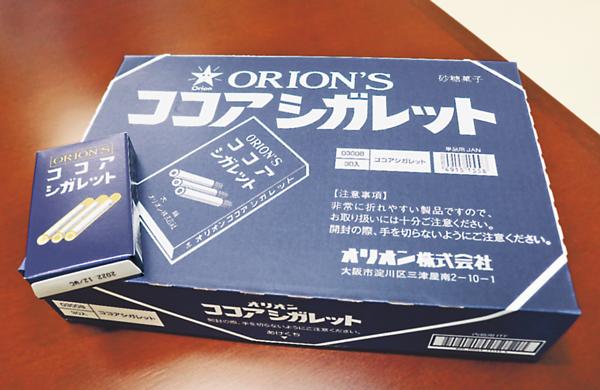

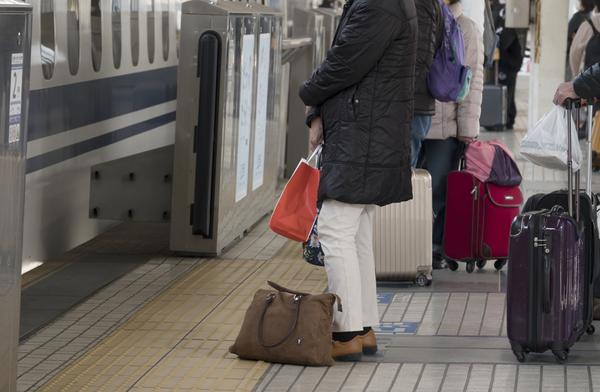
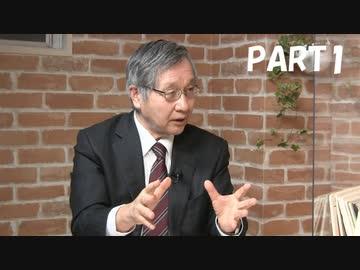
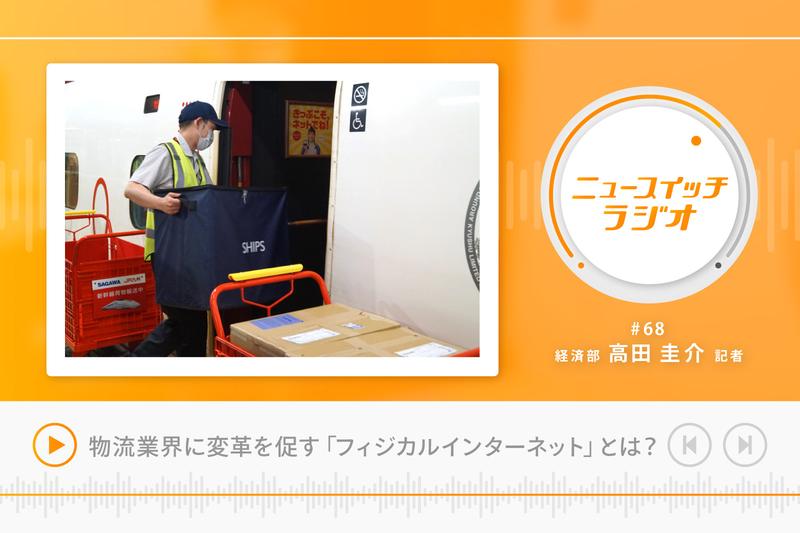
![[New Toyota Voxy (90 series)] Amplifies the characteristics of the aero body! A design that further enhances the power of the front mask! #Works direct custom deep layer 001](https://website-google-hk.oss-cn-hongkong.aliyuncs.com/drawing/article_results_9/2022/3/25/01568e2fbf021c0eaf7d013507c850a4_0.jpeg)

![[Toyota Noah / Voxy new model] Modellista releases various customized parts ... Actual vehicle exhibited at Tokyo Auto Salon](https://website-google-hk.oss-cn-hongkong.aliyuncs.com/drawing/article_results_9/2022/3/25/8268612c1e5941e62d3dfd07f8991b2f_0.jpeg)
